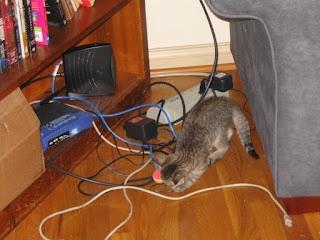I've spent some time recently thinking about the usefulness of galaxy clusters in astronomy and cosmology (aside from them being interesting in their own right). As the most easily identified most massive structures in the universe, one obvious parameter that is often desired of them is their mass. But how does one go about weighing the most massive objects in the universe?
Stellar light: This is the simplest and most straightforward way to measure the mass of a cluster, but it also requires the most assumptions. The basic idea is that if you know how much light the stars in the cluster are emitting, and if you have some good guess at how much mass a cluster of a given luminosity is (i.e., the "mass to light ratio"), then you can estimate the cluster's mass. An even simpler version is to just count up the number of galaxies in the cluster, and say, "well, clusters with this many galaxies have on average about this mass ..." And, counting the number of galaxies in a cluster is actually rather trickier than it sounds because it takes a lot of telescope time to verify that individual galaxies are in fact cluster members.
Galaxy velocity dispersion (also stellar light): If you're going to go through all the trouble of verifying which galaxies are actually in the cluster, then you can actually measure the mass of the cluster rather than merely estimating it. By taking the velocity dispersion of the galaxies along the line of sight, and assuming that the cluster is relaxed and in virial equilibrium, you can measure the mass, which is essentially proportional to the square of the velocity dispersion.
X-rays: Galaxy clusters have a lot of hot ionized gas in them. This hot gas emits high energy photons due to what is known as "bremsstrahlung": when an electron changes course as it goes whizzing past a (positively charged) ion, it is accelerating, and therefore gives of radiation. We can measure the temperature of the gas from this radiation, and like with the galaxy velocity dispersion, when we assume the cluster is in virial equilibrium—not always an accurate assumption, especially if, say, the cluster is merging with another cluster, or just forming—then we can calculate the mass of the cluster. This is one of the most popular and straightforward way of measuring cluster masses; the only tricky part really is the fact that one has to go to space in order to get X-ray data.
Weak lensing: As light from galaxies passes near a cluster, the cluster's gravity causes the light's path to bend slightly, which in turn causes the shape of galaxies behind the cluster along our line of sight to appear slightly disorted on the sky. (If you want a less hand-wavey explanation, you can look at this post I wrote last year. The mass and the physics are the same, even if the regimes are slightly different.) By measuring the average shape change of background galaxies in different annuli around the cluster, we can measure the surface mass profile of the cluster. Many people will argue (including me, perhaps) that weak lensing is the only way of measuring the entire cluster mass—gravity only cares about where the mass is, not what is causing it, and so gravitational lensing is sensitive to the underlying dark matter profile of the cluster, not just where the gas, galaxies, or light happen to live. Weak lensing is also a nice technique because it can be done with ground-based telescopes using visible-wavelength (or near infrared) light, but it does not require a plethora of spectra like galaxie velocity dispersion measurements do. Converting a measured weak lensing profile to an actual cluster mass estimate, however, involves converting a surface mass density excess to a surface mass density (i.e., the "background" surface mass density must be well-estimated) and then converting the surface mass density to a mass (i.e., assumptions about the three-dimensional structure of the cluster must be made in order to turn a two-dimensional map into a three-dimensional mass).
Sunyaev-Zel'dovich effect: One of the most exciting and promising new ways of measuring cluster masses is through their imprint on the cosmic microwave background (CMB, or as "real cosmologists" call it, the "camb"). As a CMB photon goes through a cluster, it will interact with some of the high energy electrons in the cluster's hot gas (the same ones responsible for the X-ray emission). The result is that the CMB photon gains a little bit of energy, causing the CMB to appear hotter in the direction of the cluster than it would be in the cluster's absence. Through a conspiracy of math and physics, the change in CMB intensity is essentially due to the cluster's mass alone—and because the clusters are relatively close by compared to the surface of last scattering (the origin of the CMB photons), the SZ signal is basically independent of the cluster's redshift. The redshift independence is both a blessing and a curse: while we can theoretically detect high-redshift clusters with the SZ effect, we have no way of constraining their redshift using the SZ effect alone—and high redshift objects are exactly the ones which are more difficult to detect and study using the other techniques I've described here. The SZ effect has been observed for several clusters, but to date no clusters have been conclusively discovered from their SZ signature. This may change soon, however, as two telescopes (the South Pole Telescope and the Atacama Telscope) capable of detecting the SZ effect have come online in the past year. At the very least, the SZ effect promises to be a powerful technique for constraining the measurements from the other techniques described here.















